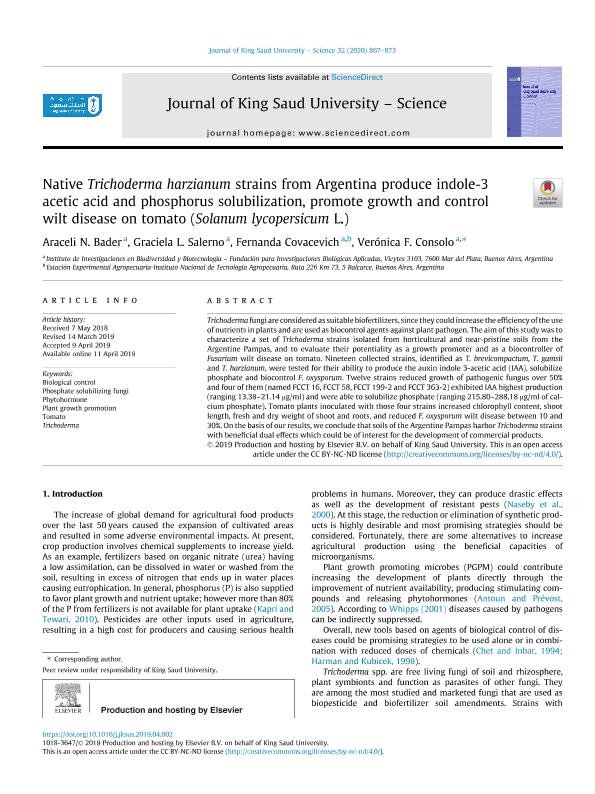Mostrar el registro sencillo del ítem
dc.contributor.author
Bader, Araceli Natalia

dc.contributor.author
Salerno, Graciela Lidia

dc.contributor.author
Covacevich, Fernanda

dc.contributor.author
Consolo, Verónica Fabiana

dc.date.available
2020-06-10T15:49:33Z
dc.date.issued
2019-05
dc.identifier.citation
Bader, Araceli Natalia; Salerno, Graciela Lidia; Covacevich, Fernanda; Consolo, Verónica Fabiana; Native Trichoderma harzianum strains from Argentina produce indole-3 acetic acid and phosphorus solubilization, promote growth and control wilt disease on tomato (Solanum lycopersicum L.); Elsevier; Journal of King Saud University - Science; 32; 1; 5-2019; 867-873
dc.identifier.issn
1018-3647
dc.identifier.uri
http://hdl.handle.net/11336/107172
dc.description.abstract
Trichoderma fungi are considered as suitable biofertilizers, since they could increase the efficiency of the use of nutrients in plants and are used as biocontrol agents against plant pathogen. The aim of this study was to characterize a set of Trichoderma strains isolated from horticultural and near-pristine soils from the Argentine Pampas, and to evaluate their potentiality as a growth promoter and as a biocontroller of Fusarium wilt disease on tomato. Nineteen collected strains, identified as T. brevicompactum, T. gamsii and T. harzianum, were tested for their ability to produce the auxin indole 3-acetic acid (IAA), solubilize phosphate and biocontrol F. oxysporum. Twelve strains reduced growth of pathogenic fungus over 50% and four of them (named FCCT 16, FCCT 58, FCCT 199-2 and FCCT 363-2) exhibited IAA highest production (ranging 13.38–21.14 µg/ml) and were able to solubilize phosphate (ranging 215.80–288.18 µg/ml of calcium phosphate). Tomato plants inoculated with those four strains increased chlorophyll content, shoot length, fresh and dry weight of shoot and roots, and reduced F. oxysporum wilt disease between 10 and 30%. On the basis of our results, we conclude that soils of the Argentine Pampas harbor Trichoderma strains with beneficial dual effects which could be of interest for the development of commercial products.
dc.format
application/pdf
dc.language.iso
eng
dc.publisher
Elsevier

dc.rights
info:eu-repo/semantics/openAccess
dc.rights.uri
https://creativecommons.org/licenses/by-nc-nd/2.5/ar/
dc.subject
BIOLOGICAL CONTROL
dc.subject
PHOSPHATE SOLUBILIZING FUNGI
dc.subject
PHYTOHORMONE
dc.subject
PLANT GROWTH PROMOTION
dc.subject
TOMATO
dc.subject
TRICHODERMA
dc.subject.classification
Otras Biotecnología del Medio Ambiente

dc.subject.classification
Biotecnología del Medio Ambiente

dc.subject.classification
INGENIERÍAS Y TECNOLOGÍAS

dc.title
Native Trichoderma harzianum strains from Argentina produce indole-3 acetic acid and phosphorus solubilization, promote growth and control wilt disease on tomato (Solanum lycopersicum L.)
dc.type
info:eu-repo/semantics/article
dc.type
info:ar-repo/semantics/artículo
dc.type
info:eu-repo/semantics/publishedVersion
dc.date.updated
2020-05-19T19:01:36Z
dc.journal.volume
32
dc.journal.number
1
dc.journal.pagination
867-873
dc.journal.pais
Arabia Saudita

dc.journal.ciudad
Riyadh
dc.description.fil
Fil: Bader, Araceli Natalia. Consejo Nacional de Investigaciones Científicas y Técnicas. Centro Científico Tecnológico Conicet - Mar del Plata. Instituto de Investigaciones en Biodiversidad y Biotecnología; Argentina
dc.description.fil
Fil: Salerno, Graciela Lidia. Fundación para Investigaciones Biológicas Aplicadas; Argentina
dc.description.fil
Fil: Covacevich, Fernanda. Consejo Nacional de Investigaciones Científicas y Técnicas. Centro Científico Tecnológico Conicet - Mar del Plata. Instituto de Investigaciones en Biodiversidad y Biotecnología; Argentina
dc.description.fil
Fil: Consolo, Verónica Fabiana. Fundación para Investigaciones Biológicas Aplicadas; Argentina
dc.journal.title
Journal of King Saud University - Science
dc.relation.alternativeid
info:eu-repo/semantics/altIdentifier/url/https://www.sciencedirect.com/science/article/pii/S1018364718308152?via%3Dihub
dc.relation.alternativeid
info:eu-repo/semantics/altIdentifier/doi/http://dx.doi.org/10.1016/j.jksus.2019.04.002
Archivos asociados
